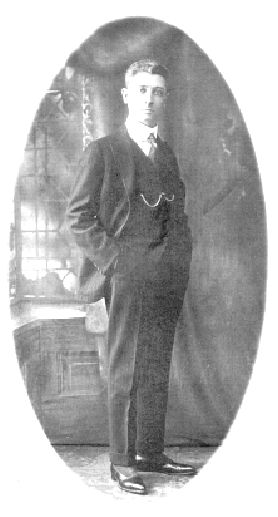
- Francesco de Socio -

- Francesco de Socio -

BIOGRAPHY by
Judith Scanlan
Francesco De Socio was born into the very wealthy and aristocratic family of Pasquale and Amalia (d’Alessandri) de Socio of Campobaso, Italy in 1882. The exact number of children is not known but Francesco had at least five siblings; Fausto, Amalia, Livietta, Enrico and Gaetano. As a young man Francesco was designated as the male of the family who would become a priest. While a student, some incriminating letters were found involving a woman and Francesco was quickly expelled from the seminary. The shame and anger that his family felt was so great that he was swiftly dispatched to the “New World”. Gaetano went on to become the priest in the family.Francesco arrived in the United States in 1902 at the age of twenty. He settled in Providence, Rhode Island. He was a handsome and dapper young man and carried himself like the princes from which he descended.
One day while walking past a dwelling Francesco noticed a pretty young girl sitting on a porch and was immediately smitten. The girl turned out to be Elvira Cipolla. Unfortunately for Francesco, Elivra was not taken with him. However, her sister, Angelina, was. In fact, Angelina found him very appealing, and to use a phrase of the day, set her cap for him. In 1905, the very “aristocratic” Francesco and the very “common” Angelina eloped and were married in Block Island, Rhode Island. He was twenty-two and she was sixteen.
This marriage further infuriated Francesco’s family and he was "disowned”. It is unfortunate that this estrangement lasted his lifetime and although his parents made several trips to the United States they never met his four children, Amalia, Giovanna, Pasquale and Fausto.
Francesco is remembered as a very formal man who dressed every day in a suit with a “starched white collar”. The only real training he had was in how to act as a gentleman. You might say the responsibilities of a working man eluded him. Sporadic attempts were made at employment, once as a conductor on a streetcar and then as a piano tuner. But for the most part he was unemployed and his wife, Angelina, had to work to provide for the family.
He was a violent man who beat his wife and children leaving them fearful and terrorized by his presence. One often told story was how at dinner the very well bread Francesco expected exemplary table manners from his small children. To insure this he kept a cane hanging on the wall by his chair, to be used when someone erred. Many times without a word the cane came down and a child got a whack. It was up to the child to figure out what he or she was doing wrong, or the strikes would continue with every infraction. When a mealtime selection was not prepared to Francesco’s liking it was often thrown against the wall. There were times when his friends would visit and he would want the children to perform. Because of their fear they dared not refuse, and often they would be singing dancing with tears running down their faces. Sadly, the memories Francesco’s children were left with were not pleasant.
When Francesco’s fourth child Fausto was still an infant, Angelina found the strength to leave him. After this happened, he offered no monetary support, or sought any further contact with his children. He made his way to New York City, presumably to be close to his brother, Fausto, who was living there. Francesco was married for a second time to a woman who had a daughter. This marriage lasted until his death, in 1927. Nothing more is known about his life in New York except hat he owned an apartment building and died at the age of forty-five.
Francesco’s first wife, Angelina, attended his funeral along with two of their four children, Amalia and Pasquale. In spite of the many mistakes Francesco made as a husband and father he never lost the love of Angelina. Unfortunately, the same could not be said for his daughter, Giovanna, for she remained estranged until his passing. As for his youngest child Fausto, he never got to know his father.
J.S. 1995